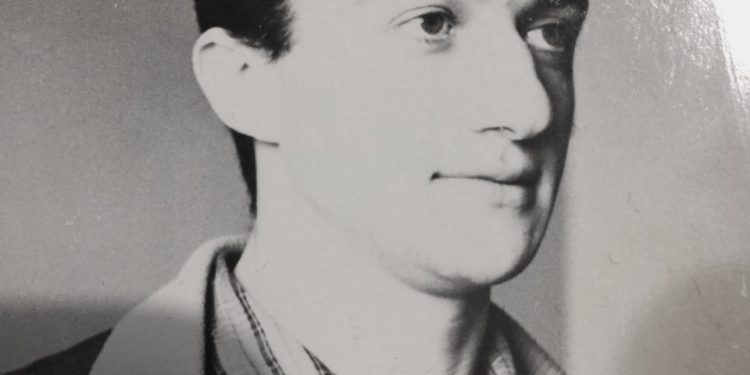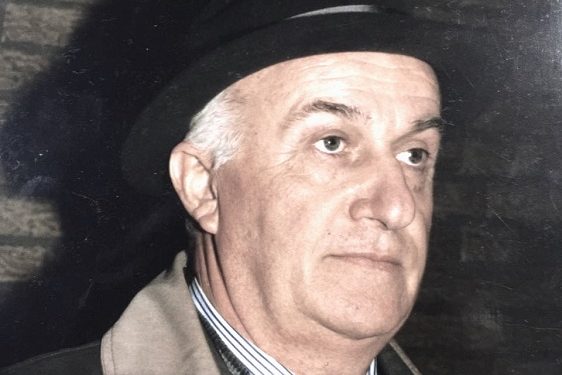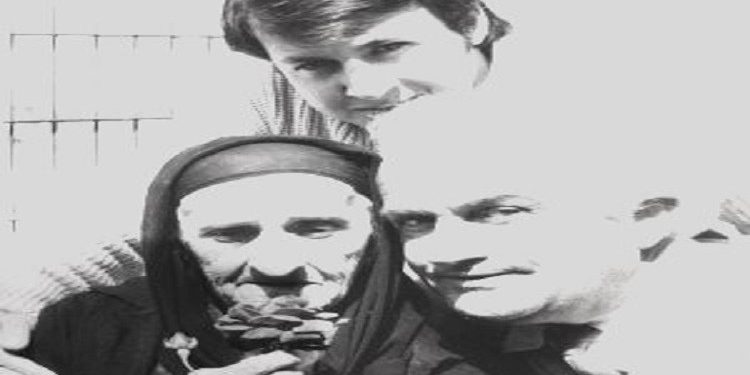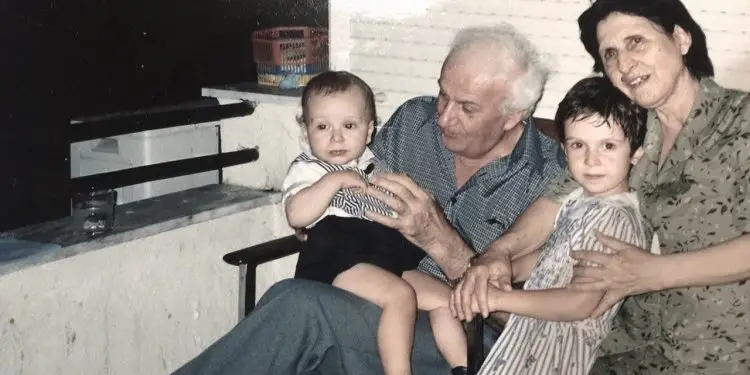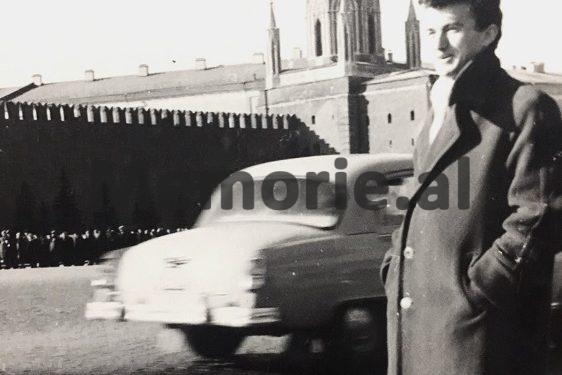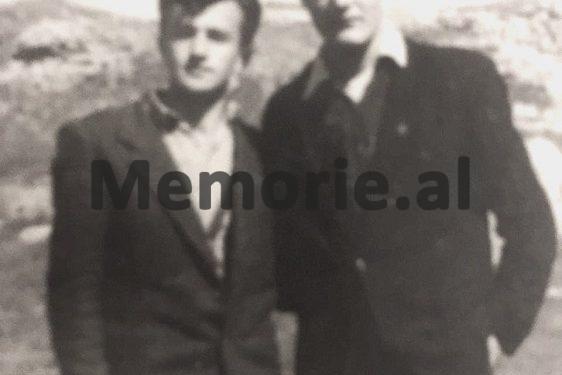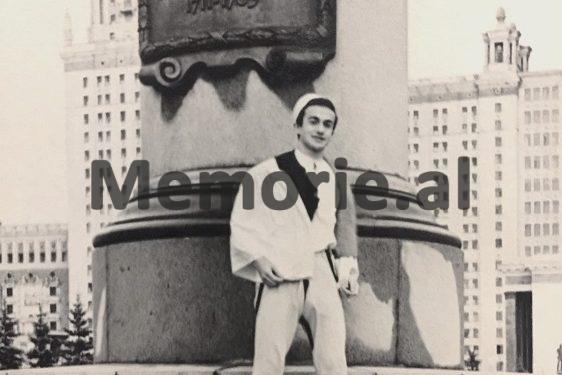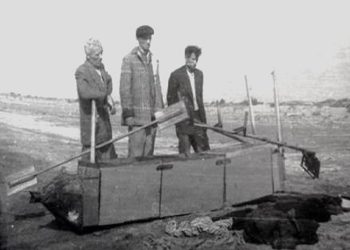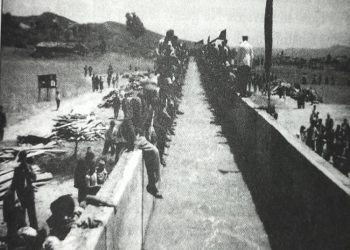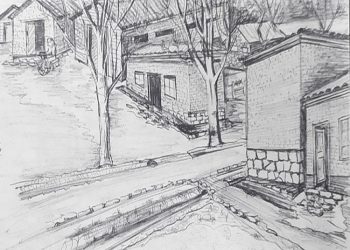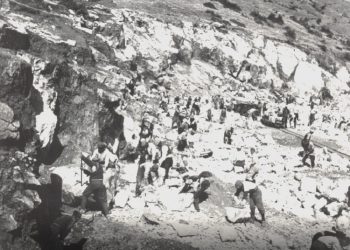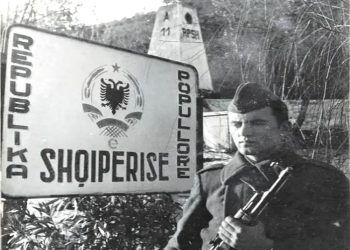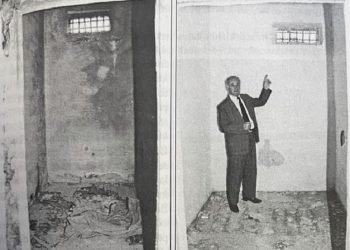From Sokrat Shyti
Part forty-seven
Memorie.al / The writer Sokrat Shyti is the “great unknown” who for several years has shown the tip of the iceberg of his literary creativity. I say this based on the limited number of his published books in recent years, mainly the voluminous novel “The Ghost Night” (Tirana 2014). The novels: “BEYOND MYSTERY,” “BETWEEN TEMPTATION AND WHIRLPOOL,” “THE DIGGING OF NIGHTMARES,” “THE SHADOW OF SHAME AND DEATH,” “COLONEL MAIN HAND,” “THE FADING HOPES,” “THE TWISTS OF FATE” I, II, “SURVIVAL IN THE COWSHED,” as well as other works, all novels with 350 – 550 pages, are in manuscripts waiting to be published. The dreams and initial enthusiasm of the young novelist, returning from studies abroad full of energy and love for art and literature, were cut short early by the harsh blade of communist dictatorship.
Who is Sokrat Shyti?
Having returned from studies at the State University of Moscow right after the rupture of Albanian-Soviet relations in 1960, Sokrat Shyti worked in “Radio-diffusion” (which at that time was located on Kavaja Street), in an editorial office with his journalist friends – Vangjel Lezho and Fadil Kokomani – both of whom were later arrested and subsequently executed by the communist regime. Besides the radio, 21-year-old Sokrat had passionate literary interests at that time. He wrote his first novel “Madam Doctor” and was on the verge of publication, but… alas! Shortly after the arrest of his friends, to fill the cup, one of his brothers, a painter, escaped abroad.
Sokrat was arrested in September 1963, and in November of that year, he was interned along with his family (his mother and little sister) in a place between Ardenica and Kolonje of Lushnje. For 27 consecutive years, the family lived in a cowshed made of reeds, without windows, while Sokrat was subjected to forced labor. During those 27 years, he was legally obliged to report three times a day to the local authority. He had no right to leave the place of internment, was deprived of any kind of documents, etc. In these conditions, amid a cowshed, he gave birth to and raised his children. Precisely from this event, or more accurately a very long story of persecution, he based his writing of the book “Survival in the Cowshed”!
Agron Tufa
Continued from the previous issue
EXCERPT FROM THE BOOK “SURVIVAL IN THE COWSHED”
In fact, an inner agitation troubled me, as for the first time I would see with my own eyes how the highest authority of the state judiciary would present himself before me after three years: with his former face, when we used to talk amicably about literature, or with the mask of pretense after the alienation of my social status?
Before I could finish my speculation, he approached— a hefty figure, with a drawn portrait and disheveled hair, still displaying the same sharp gaze as before. I noticed a smile, uncertain whether he was pleased to see me or expressing annoyance that I had the courage to meet him here, in these moments when he wanted to rest, especially with my status as a declassified individual, as an interned person.
– “At first, it seemed strange to me when the companion mentioned your name beside my ear, and naturally, I asked myself how you ended up here…” – he addressed me with his thin voice as he approached closer, extending his hand to greet me.
– “Well, it just so happened, Mr. Chairman…” – I replied, looking up at him because of his height, almost a head taller than me.
– “Since I don’t have time to speak at length, as I am accompanied by two main district leaders, I’ll start with a concrete self-criticism: I feel indebted to you! I scold myself for not being able to do anything to help after the disaster that befell your brother…!” – he said with a sense of remorse. “Especially unforgivable is my lack of attention after the decision of the Government Commission. I don’t know how to characterize my behavior over these three years, as I had no notion of how my friend lived under the harsh conditions of internment, what he did, where he stayed?!
I cannot say that I had forgotten you, as I would naturally remember you before my battalion comrades when we talked about the published book, in which I was the editor. But that was it; the memory didn’t go beyond that. The absence of inner agitation came from the condition in which you found yourself, because it never crossed my mind that a few bastards would dare to abuse the Decision of the Government Commission and treat you as a family of criminals. I had the impression of a general internment, that you would be placed somewhere, in a barrack, but certainly not in the cowshed of a peasant, completely isolated from others!
I was astounded when the first secretary of the Party Committee in your district directed this question at me: ‘In which cases are honorable families treated in inhumane ways’?! Certainly, even for a completely unfamiliar family, I would have felt a great discomfort in giving an answer, let alone for you, who belongs to respected intellectuals. I have known the first secretary for a long time. I especially appreciate him for his character and maturity in making important decisions that require courage and prudence. It pleased me when he told me about placing your family in a suitable shelter, like all the residents of the village of Kolonje. And that he proposed to the Government Commission to remove the measure of internment, to return to expulsion, for good behavior.
“Now the request from the district is on my desk. I will prepare the material for the next meeting after discussing it beforehand with the Minister of the Interior. Therefore, you should also write a plea to ease the punishment, and send it by mail from here in my name. At least you’ll relieve yourself from the stress of appearing at the Internal Affairs Department, and you won’t need to acquire a travel permit. From now on, with the support of the first secretary, a new impression will be created of you and your esteemed family. Do you have anything else to add, since time does not allow for much more?” – he added with an expectant look.
– “If it’s not a state secret, may I know why the length of the sentence is not specified in the Government Commission Decision?!” – I dared to ask. “Or has the same person who exiled us to the cowshed influenced this as well?!…”
– “I cannot provide you with an answer now, as I was serving abroad when the decision regarding your family was made.”
– “One more question, if possible: is there any line in the Decision that states ‘Returning to Tirana is prohibited’?!”
– “Who told you this?” – the chairman asked with some nervousness.
– “The officer from the Internal Affairs Department who handles internments and expulsions. It’s enough for this thought to circulate within the lines of this Decision to encourage the enforcers that my exile will continue even to the second stage of expulsion, meaning I will remain permanently outside the orbit of literary creators, unwanted, as if I have committed the most hideous and dangerous crime against society!” – I expressed my internal revolt.
– “I advise you to keep such a serious accusation buried in the deepest corners of your mind, as it may be interpreted by your detractors as agitation and propaganda against the people’s power. And if they get you under this clause, nobody, including your friend here who wishes you well, can protect you. So, we agreed: write the request and send it today by post to the Chair of the Supreme Court!” – he said, extending his hand to say farewell. “One more friendly piece of advice: do not tell anyone that you met with me at the Reception House in Berat today. This message should also be relayed to your uncle to keep in mind. If I find any occasion to go on duty in Vlorë, Fier, or Gjirokastër, and I’m alone, maybe we can see each other in Kolonje…” – he added at the end before departing.
I was left in a whirlpool of troubled thoughts. But more than anything else, I was struck by the evasiveness of his responses to my questions. It should have been the opposite if he had truly felt the desire to help me, based on the fact that he, as the deputy chairman of the Government Commission on Internment and Expulsions, has complete and accurate information on every case, especially mine, following the direct interest of the first secretary of the Party Committee of the district, who during the meeting had touched on his honor and prompted him to fulfill an obligation that he should have had in mind himself.
After this reasoning, I formed the impression that his attitude towards me during these minutes could only be described as a forced pretense, a formality to get through the moment. It was as if he were telling me: “You should be clear: I cannot go beyond the limits of self-defense. Because I am not like your Party secretary, who puts a veto on district leaders to correct the massacre of a terrible injustice.
Despite the dissatisfaction that came across in response to my answers to your questions, do not expect any kindness from me besides the alteration of the sentence, from internment to expulsion. And do not think that this can happen with a mere stroke of the pen. First, more careful and convincing legal reasoning must be found, so that there are no objections from other members of the Commission, and then it can be proposed!”
At that moment, my uncle emerged from the main entrance along with the manager of the Reception House and the driver of the first secretary. I noticed that the manager cast a curious glance at me, perhaps because my simple appearance did not convince him that I was a journalist, as was whispered within the environment. This stirred in me the thought that in the kitchen, rumors about my meeting with the Chairman of the Supreme Court had likely already begun, and all sorts of assumptions and speculations had been thrown around regarding the main question: whether this meeting, held without the presence of others, was arranged beforehand or truly happened by chance?!
For the seasoned onlookers, the interest in clarification; which of the two possibilities reflected the truth presented special importance, because depending on it, the value of Naun, as the head of Social Nutrition, would be measured in the future, whether his chances of staying in this workplace would increase or decrease. Nature proved to be wonderfully generous and kind to me, as on March 5, it gifted a beautiful warm day, with bright spring sunlight and an infinitely blue sky, without a cloud in sight.
It was this delightful weather that allowed us to dress in suits without coats or overcoats to go as guests to Arqelin’s house, where the engagement ceremony would take place. Under the attractive pull of curiosity, I, as the groom, dressed in a black suit and a white collared shirt, was naturally at the center of attention for the women and girls who had specifically come out onto balconies and windows to watch with extraordinary interest the “delegation” of guests, composed of my older sister and her husband, my older brother and his wife, my second sister who shared in the burdens, and the third daughter of my brother, the one holding the suitcase with gifts.
From the moment the interesting news spread that on March 5 the much-discussed engagement ceremony would take place, which many curious people considered an impossible desire, and the hour of departure of the guests from my older sister’s house was clarified, there was a lively movement of women and girls from other neighborhoods, who came specifically to stand on both sides of the street at the Internal Affairs Department, driven by a gnawing interest beyond the dimensions of ordinary female curiosity, due to the fact that around this engagement, the most astonishing gossip and assumptions had been woven together. Above all, this engagement was gestated with the essence of an unusual love and was accompanied by painful sorrow and anxious anticipation.
Alongside this unbelievable and surprising event: for the first time in the city, an incredibly harsh entanglement emerged between the love of a couple and the threats of politics, intertwining tumultuous contradictions and prolonged frictions among parents, relatives, and the girl!
Many voices expressed astonishment and pity for this blind spiritual connection, which drained the mind to emptiness and dulled the reasoning of the girl with her wonderful behavior, reducing her to a being in complete disarray. It robbed her the ability to perceive reality with the eye of a practical observer, consequently losing her understanding of normal conditions—essential traits that every girl needs when starting her own family. The peak of this disarray became evident when she agreed to live in the cowshed, amidst extreme, harrowing poverty!
Therefore, those who witnessed the progression of this blind love from this perspective were gripped by the fearful assumption that the second daughter of the uncle was suffering from a mental illness characterized by terrible crises, placing her among the ranks of incurable mental diseases leading towards insanity! In fact, there were fervent attempts from gossipmongers to bestow frightening dimensions of convincing truth upon this alarming claim.
To this end, even the most deceitful fabrications were used, such as the story that mother Ulë, together with the elder daughter, Arqelin’s sister, knocked on the doors of several women to the confused girl, hoping their visit could disrupt her dark magic and return the disoriented one to the right path…
Meanwhile, the women and girls who supported and wanted to protect the well-mannered girl blamed all the blame on me, calling me the sole cause of this mental disarray. Therefore, every time my name was mentioned, they unloaded their fury against me. But Lia’s close friends held a different stance, as they firmly believed the truth that a powerful, unusual love had blossomed between us, so they constantly repeated with complete conviction that it should not end in failure, even though it was uncertain how the future of this relationship would unfold.
Their hearts instilled in them the conviction that surely a sudden success would come, overturning all the oppositions and the malicious intentions, and that the sufferings of their friend would not fall into the abyss of disregard; the moment would come when the rainbow of hope would emerge.
More than a strong and courageous desire for love, this was an inner spiritual demand for a genuinely surprising twist of fate, as if it were a miraculous wonder! Because the energetic intervention of the first secretary of the Party Committee and his decision to relocate my family from the cowshed to a normal apartment could only be referred to as a miracle.
Therefore, immediately after this surprising decision, like the force of a powerful earthquake, the speculations and cynical rumors about the madness and derangement of the uncle’s daughter were overturned. The green light of hope was lit, which multiplied the dimensions of curiosity, set the observers into a whirl of activity, and reignited a fierce debate among the supporters of the first secretary and the aides of the chairman of the Executive Committee. A wave of fervent expectation rose, causing everyone to feel a gnawing nervousness.
I had no doubt that during these minutes of curious observation, the whispered conversations were incessant: some, not wanting to remain silent and gagged, babbled whatever came to their minds without understanding what they were saying.
Others, who considered themselves unyielding tough nuts, cared little about contradicting themselves, shamelessly denying previous assertions under the impetus of blind arrogance, which encouraged them to feel proud of the opinions they had previously scorned! Today, in light of this complex occurrence, the incredulous possibility of exclusion was not excluded; the supporters of the first secretary, along with the aides of the chairman of the Executive Committee, might place their discussions on a common denominator to move in the same direction, albeit in the opposite way!…
When I shifted my attention from their whispers and babble, I focused on the conversation between my older brother and my sister’s husband, as he was describing the grand success of the performance “The Fisherman’s Family,” elaborating on his role as Vehip, which he played himself. In the end, he did not hesitate to boast openly that for this role, he received special commendations from the chief director and the theatre management, in addition to prolonged applause from the audience.
– “I have also had a leading role accompanied by success in the comedy ‘The Carnivals of Korçë,’” – my brother added to draw my attention, as if to say: “Although you have seen these plays, you need this explanation too, since you have been detached for three years from the artistic life of the capital, and it is essential for you to refresh your memory, considering that an actor brings something new to every performance, delves deeper into the role, gives more thought to it, and connects more and more spiritually, experiencing the explosive moments on stage, not just in imagination. Besides these, I cannot deny that I like Vehip more because he consumes me so thoroughly that after the performance, I stay somewhat like him for a while…”
– “You actors have a diverse profession, and you change your skin according to the role. While in ‘Vehipi’ you are a despised coward from the big brother, in ‘Nikollaqi’ you are a scheming trader and miser, two completely opposite types. On this occasion, I’ll ask you a straightforward question: how and to what extent does the inner spiritual world of the character influence the actor’s personality?”
– “You’ve asked a strange and interesting question!” – my brother said, looking with great curiosity at my sister’s husband.
– “I had this question in mind before, but there hasn’t been an opportunity to pose it, since we rarely meet, both for pleasure and otherwise,” – Stavri added. “The impetus for this question comes from the fact that a person’s character must be stable. But with you, something very special happens that doesn’t happen to others: you have to shed your personal nature to fully adapt to the role.
You undergo a fundamental change, which in life becomes almost impossible. You, being seekers of diverse types, must have noticed and should know that no matter how hard someone tries to follow in the footsteps of a good person, they still can’t succeed. We return again to the essence of the question: what happens to you, who have the gift of changing your skin and nature according to the role after your performance, when you return to yourself?” /Memorie.al
Continues in the next issue




